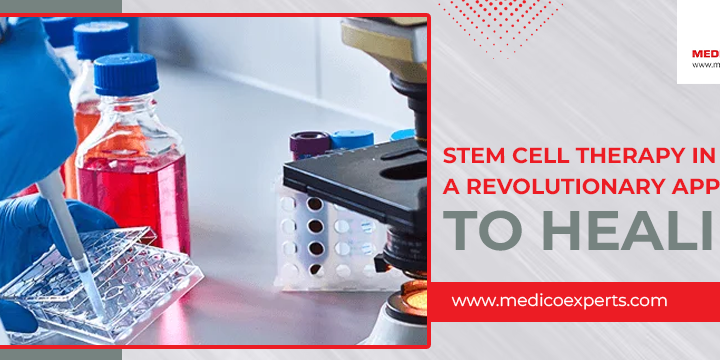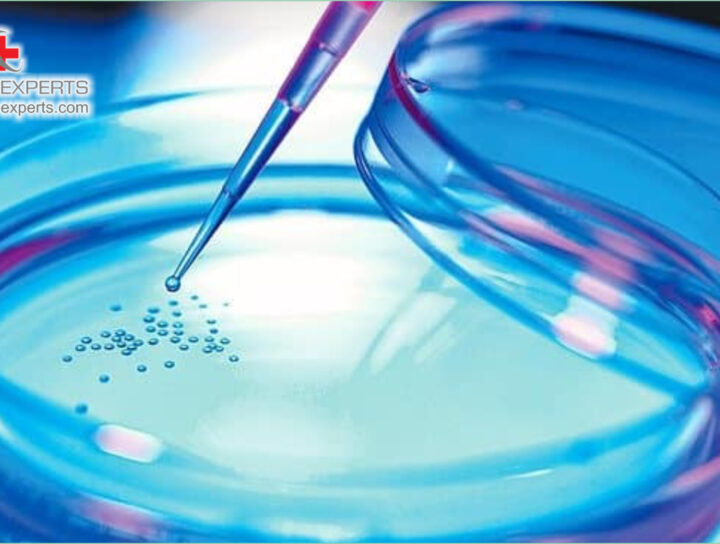Stem cell therapy for Infertility Treatment in India with Best Results
Have you tried everything to become pregnant and now losing hope?
You must be worried that you are about to cross the age of fertility and yet not get conceived. Every woman has a desire to become a mother and enjoy motherhood. You might be often feeling sad and depressed whenever you might be seeing other mothers playing and taking care of their kids.
Your feelings are genuine.
However, you don’t need to lose hope. With the advancement of technology, there is a new ray of hope for the females who are either approaching 40 or crossing 40. You can also play with your own kids and see them growing right from crawling to walking, schooling, and living their own life.
You definitely would like to read about the experience of Malina, a 39-year-old lady from Lagos, Nigeria. She got married 12 years ago and lives happily with her husband. Malina and her husband have made many plans for their future and their child.
However, life always throws challenges when you expect them the least. They started trying for the kids after two years of their marriage. Unfortunately, even after trying for lots of years, she is not getting pregnant. She visited many gynecologists and fertility centers. She has even tried IVF thrice but success has always betrayed her. She almost lost all hopes to conceive.
We, MedicoExperts, have organized an OPD camp on fertility in Nigeria. She met us in the camp. She came there with lots of hope in her eyes. She narrated her story to our experts and came prepared with all the past reports. Doctors recommended she go for IVF with donor eggs. Since she had tried most of the treatments like medication, IVF, and ayurvedic medicine, she did not want to try IVF once again.


She was pretty hopeless and then the doctor shared the ongoing research of stem cells for similar kinds of patients and also explained the possible pros and cons.
She left the camp clueless and in a confused state. A week later she called the MexicoExperts camp organizing team and, showing her willingness to speak to a Stem cell expert. She was thereafter introduced to the MedicoExperts impaneled stem cell doctor who was doing thorough research on stem cells therapy application for fertility issues.
The doctor explained the process and probability of getting pregnant. She gets pretty much convinced and decides to come to India to get stem cell treatment.
Treatment started, and after 5 months of completion of treatment, the emotional moment came, which she had been waiting for for so long.
She couldn’t believe the pregnancy kit showing her conceive. To verify again she went to a local gynecologist for confirmation. The gynecologist also confirms after the urine test that she is pregnant.
No doubts left and she was pregnant.
At that moment, she got so overwhelmed with her emotion and immediately called the MedicoExperts team and doctor to share the news.
She feels so much special currently; she is now a mother of a beautiful daughter.
Before we discuss the treatment, Let’s first understand what infertility is and what available treatment options are.
When a male sperm fertilizes a female egg in a female’s fallopian tube. The ovary releases the eggs during ovulation and pushes them into the fallopian tube.
After fertilization, the fertilized egg travels down into the uterus, where implantation occurs.
After the sperm fertilizes the egg, the egg can be implanted 5–6 days later.
Successful implantation of a fertilized egg in the uterus results in pregnancy.


Infertility is the inability of women to get pregnant despite having multiple, frequent and unprotected sex during the ovulation period for at least a year for most couples.
The reason for infertility can be an issue with either you or your partner or a combination of factors in both the partners.
What causes Infertility?
The reason for infertility can be both in males and females. Let’s first understand the causes of infertility in males.
Causes of male infertility
These main reasons for male infertility are as follows.
Sperms are the beginning of the reproductive cycle. When the male cannot produce healthy sperm, the reproductive cycle doesn’t start at all.
This may happen due to different reasons that include undescended testicles (is a testicle that hasn’t moved into its proper position in the bag of skin hanging below the penis), genetic defects, health problems such as diabetes, or infections such as chlamydia, gonorrhea, mumps or HIV, etc.
Enlarged veins in the testes (varicocele) can also affect the quality of sperm.
Sperms have to cover the distance up to the fallopian tube from the vagina where eggs are waiting to be fertilized. Due to mobility issues, the sperm is not able to reach the fallopian tube.
This can happen due to multiple reasons including, but not limited to, problems like premature ejaculation, certain genetic diseases (such as cystic fibrosis), structural problems (such as a blockage in the testicle), and damage or injury to the male reproductive organs.
There are some environmental factors that can impact both the quality of sperm and the mobility of sperm. These factors include pesticides and other chemicals, and radiation.
Some other factors like Cigarette smoking, excessive alcohol consumption, marijuana addiction also affect male fertility.
Some medicines such as anabolic steroids, medications for bacterial infections are also considered the risk factors for male fertility
Some diseases such as high blood pressure, diabetes, vascular disorders, and depression may also affect male fertility.
Frequent and excessive exposure to heat, such as in saunas or hot tubs, can raise body temperature and may affect sperm production.
Causes of female infertility
Causes of female infertility may include:
Ovulation disorders affect the ovaries’ ability to release eggs. Hormonal disorders, such as polycystic ovary syndrome, are among them. Hyperprolactinemia (having too much prolactin), the hormone that stimulates the production of breast milk, can also interfere with ovulation.
Thyroid hormone levels that are too high (hyperthyroidism) or too low (hypothyroidism) can disrupt the menstrual cycle and lead to infertility. Excessive exercise, eating disorders, and tumors are all possible underlying causes.
Ovulation disorders are caused by problems with the hypothalamus or pituitary gland’s regulation of reproductive hormones, as well as problems in the ovary.
- Polycystic ovary syndrome (PCOS): PCOS is a hormonal disorder that is often found in females of reproductive age. In PCOS, the ovaries might be enlarged. As a result, the ovaries might fail to function regularly and affect ovulation. PCOS might be the result of insulin resistance and obesity.
- Hypothalamic dysfunction: Two hormones, follicle-stimulating hormone (FSH) and luteinizing hormone (LH), which are produced by the pituitary gland are responsible for stimulating ovulation each month. Excessive physical or emotional stress, extreme body weight gain or loss, or a recent significant weight gain or loss can all disrupt the production of these hormones and affect ovulation. The most common symptoms are irregular or absent periods.
- Primary ovarian insufficiency: Also called premature ovarian failure, is caused by an autoimmune response or the premature loss of eggs from your ovary, which can be caused by genetics or chemotherapy. In women under the age of 40, the ovary no longer produces eggs, and estrogen production is reduced.
- Too much prolactin: The pituitary gland can cause excess production of prolactin (hyperprolactinemia), which reduces estrogen production and can cause infertility. This can also be caused by medications you’re taking for another condition.
Uterine or cervical abnormalities, including abnormalities with the cervix, polyps in the uterus, or the shape of the uterus. Uterine fibroids are noncancerous (benign) tumors that block the fallopian tubes or prevent a fertilized egg from implanting in the uterus, resulting in infertility.
Fallopian tube damage or blockage, Inflammation of the fallopian tube is a common cause of fallopian tube damage or blockage (salpingitis). Pelvic inflammatory disease, which is typically caused by a sexually transmitted infection, endometriosis, or adhesions, can cause this.
Endometriosis affects the function of the ovaries, uterus, and fallopian tubes when endometrial tissue grows outside of the uterus.
Primary ovarian insufficiency (early menopause), When the ovaries stop working and menstruation stops before the age of 40, this is known as primary ovarian insufficiency (early menopause). Although the cause is often unknown, certain factors are associated with early menopause, including immune system diseases, certain genetic conditions such as Turner syndrome or carriers of Fragile X syndrome, and radiation or chemotherapy treatment.
Pelvic adhesions, Pelvic adhesions are scar tissue bands that bind organs in the pelvis and can form as a result of a pelvic infection, appendicitis, endometriosis, or abdominal or pelvic surgery.
Certain cancers (particularly reproductive cancers) often impair female fertility. Both radiation and chemotherapy may affect fertility.
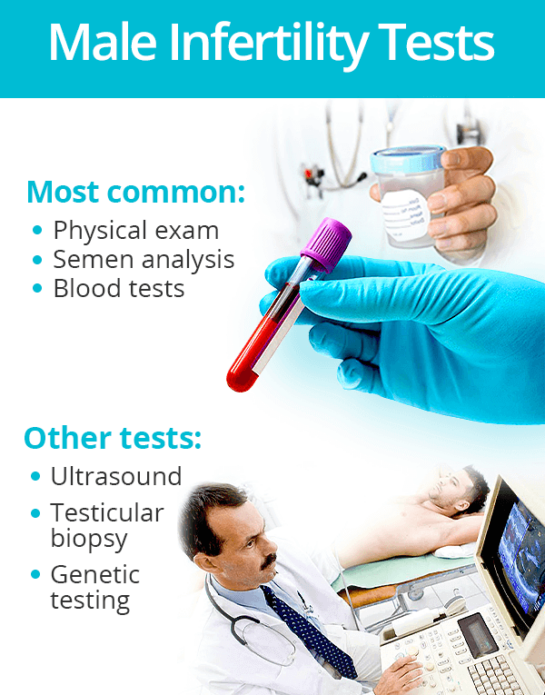
Tests for men
The testicles must produce enough healthy sperm, and the sperm must be ejaculated effectively into the vagina and travel to the egg for male fertility.
Male infertility tests aim to see if any of these processes are functioning normally.
You may be subjected to a general physical examination, which may include a genital examination. Tests for fertility may include:
- Semen analysis. Your doctor may ask for one or more semen specimens. Semen is generally obtained by masturbating or by interrupting intercourse and ejaculating your semen into a clean container. A lab analyzes your semen specimen. In some cases, urine may be tested for the presence of sperm.
- Hormone testing. You may have a blood test to determine your level of testosterone and other male hormones.
- Genetic testing. In order to determine whether infertility is caused by a genetic defect, genetic testing may be performed.
- Testicular biopsy. In select cases, a testicular biopsy may be performed to identify abnormalities contributing to infertility or to retrieve sperm for assisted reproductive techniques, such as IVF.
- Imaging. In certain situations, imaging studies such as a brain MRI, transrectal or scrotal ultrasound, or a test of the vas deferens (vasography) may be performed.
- Other specialty testing. Other tests to evaluate the quality of the sperm, such as examining a semen specimen for DNA abnormalities, may be performed in rare cases.
Tests for women
- Ovulation testing. These are the hormone tests to check the hormone levels of luteinizing hormone (LH), progesterone (a hormone produced after ovulation), and prolactin. These are the hormones that are found in different levels during the whole menstruation cycle.
- Hysterosalpingography: This is the X-Ray based test to check for problems inside the uterus. As a part of the test, X-ray contrast is typically injected into your uterus and an X-ray is taken. This test also indicates whether the fluid passes out of the uterus and spills out of your fallopian tubes.
- Ovarian reserve testing: This test is to check the quality and quantity of eggs available for ovulation. Women are at risk of a depleted egg supply, particularly when the woman is older than 35.
- Other hormone testing: Other hormone tests check levels of ovulatory hormones as well as thyroid and pituitary hormones that control reproductive processes.
- Imaging tests: A pelvic ultrasound looks for uterine or fallopian tube disease. Sometimes a sonohysterogram, also called a saline infusion sonogram, or hysteroscopy is used to see details inside the uterus that can’t be seen on a regular ultrasound. Depending on your situation, rarely your testing might include:
- Laparoscopy: Making a small incision beneath your navel and inserting a thin viewing device to examine your fallopian tubes, ovaries, and the uterus is all part of this minimally invasive procedure. Endometriosis, scarring, blockages or irregularities of the fallopian tubes and problems with the ovaries and uterus can all be detected with a laparoscopy.
- Genetic testing. Genetic testing helps determine whether there are any changes to your genes that may be causing infertility.
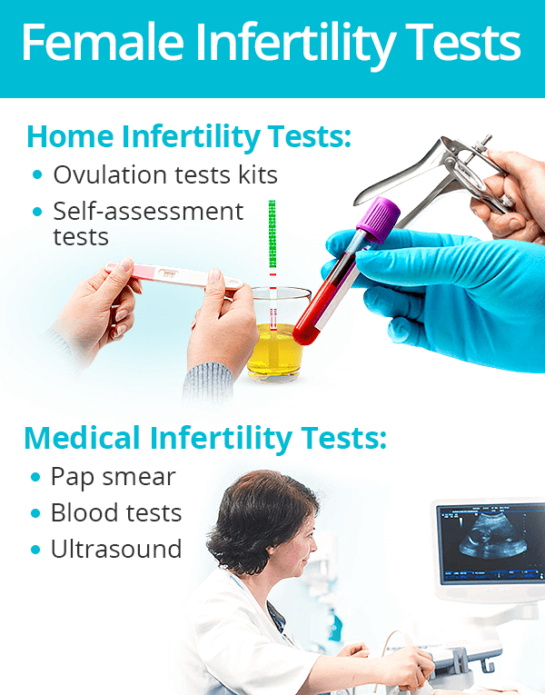
Treatment for men for infertility
Treatment options for men with general sexual issues or a lack of healthy sperm include:
Improving lifestyle and certain behaviors can improve chances for pregnancy, including discontinuing select medications, reducing or eliminating harmful substances, improving frequency and timing of intercourse, exercising regularly, and optimizing other factors that may otherwise impair fertility.
Certain medications can boost sperm count and increase the chances of a successful pregnancy. These drugs have been shown to improve testicular function, including sperm production and quality.
Surgery may be able to reverse a sperm blockage and restore fertility in some cases. In some cases, repairing a varicocele surgically can improve your chances of getting pregnant.
When ejaculation is difficult or there is no sperm in the ejaculated fluid, these techniques are used to obtain sperm. They may also be used when assisted reproductive techniques are being considered but sperm counts are low or abnormal.
Treatment for women for infertility
The treatment depends upon the root cause of infertility. Depending upon the nature and severity, some women need only one or two therapies to improve fertility whereas Other women may need several different types and cycles of treatment to achieve pregnancy.
Doctors recommend fertility drugs to those women who are infertile due to ovulation disorders.
These medications help in regularizing the ovulation process.
IUI is the process wherein the healthy sperm are placed directly in the uterus around the time the ovary releases one or more eggs.
The timing of IUI is typically coordinated with your normal cycle or with fertility medications.
If you’re having uterine problems such as endometrial polyps, a uterine septum, intrauterine scar tissue, endometriosis, pelvic adhesions, and fibroids then your doctor may recommend hysteroscopic or laparoscopic surgery.
For larger fibroids, you may require open surgery by creating an incision in the abdomen.
Assisted reproductive technology (ART) is the fertility treatment in which the egg and sperm are managed by doctors and fertilized with the help of equipment.
In vitro fertilization (IVF) is the most prevalent ART technique.
IVF: In IVF, doctors give medications to stimulate the ovaries to release multiple mature eggs. Doctors retrieve these eggs and thereafter fertilize them with sperm in a dish in a lab. They observe the embryo formation and implant the most healthy embryos in the uterus.
Other techniques in an IVF cycle are as follows. The doctor recommends them after analyzing the case and history of the couple.
- Intracytoplasmic sperm injection (ICSI): In this technique, a single healthy sperm is injected directly into a mature egg with the help of equipment. ICSI is typically used when the sperm quality and quantity are poor. Doctors also prefer this when prior fertilization during IVF cycles has failed.
- Assisted hatching: In this technique, the doctor opens the outer covering of the embryo and implants the embryo into the lining of the uterus.
- Donor eggs or sperm: In most cases, ART is performed using a couple’s own eggs and sperm. However, in some cases, where there are severe problems with either the eggs or the sperm, the doctor may recommend you to use eggs, sperm, or embryos from a known or anonymous donor.
- Gestational carrier: When women don’t have a functional uterus, doctors recommend IVF using a gestational carrier. In this case, doctors place the couple’s embryo in the uterus of the carrier for pregnancy. This is also commonly known as surrogacy.
Let’s explore the advance treatment option that is stem cell therapy for infertility in India.

Stem Cell Therapy for Male Infertility in India:
In vitro differentiation of male germ cells from pluripotent stem cells in vitro has made significant progress in recent years.
Male infertility is discovered, or more accurately, confirmed, on two main bases. The first is the semen analysis, which is carried out differently on various occasions. The analysis of the semen is then followed by a history of physical examination and investigation, which may involve the use of different serums.
Multipotent stem cells are a significant and highly beneficial treatment in the case of a modality.
Male infertility can be treated using stem cell therapy, which is highly useful and successful in curing the condition. It also works well when germ cells become dysfunctional. Numerous cell tests, including those involving pathogens, take performed during the spermatogenesis process.
A place of concern and consideration is the infusion that occurs inside the testicular region, which contains a suitable microenvironment that includes germ cells as well. When it comes to methods to treat male infertility, stem cell therapy is among the most well-known and dependable.
Stem Cell Therapy for Female Infertility in India:
For female infertility, stem cells are used for ovarian regeneration and oocyte generation and are typically very helpful for females over 35 where the eggs are depleted.
If you are new to stem cells please read https://www.medicoexperts.com/stem-cell/ to understand stem cells, their sources, and the therapies based on them.
In summary, Stem cells are undifferentiated cells that exist in embryos, fetuses, and adults and have the capability to produce differentiated cells.
A local anesthetic injection is used to extract stem cells from bone marrow. The extracted bone marrow is then processed in a Stem Cells lab, where the stem cells are separated from other tissues and multiplied in a laboratory environment.
After that, the Stem cells are injected back into the uterus. The stem cells reach the organ which needs the repair and starts converting themselves into the cells of desired functionality. These new cells start the healing process of the organ.
Depending on the case and other factors such as comorbidities, age, and the patient’s current symptoms, multiple stem cell therapies may be required.
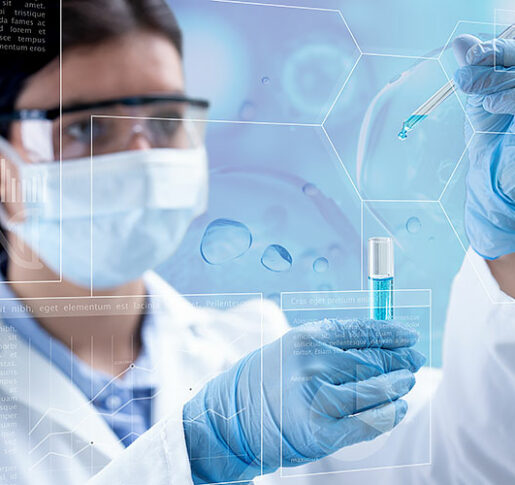

In comparison to the cost of the same treatment in other countries, infertility treatment in India is relatively less expensive.
This cost-effectiveness is achieved by combining the best specialists with hospitals that are well-equipped with the most up-to-date I and technology to ensure a successful outcome.
In India, stem cell therapy for infertility costs start at $2,000 per cycle, depending on the patient’s current condition, treating doctor, and recommended protocol.
The patient will be required to stay in India for 10 to 30 days, with the possibility of extending the stay to 45 days in some cases.
A study of 17 women who underwent autologous SCT showed that five (29%) recovered their ovarian function and that the recovery rate for women younger than 25 years was 79%.
Frequently Asked Questions and patient concerns:
1. Can infertility be treated with stem cells?
Stem cells are seen as a new hope for improving the treatment of female infertility through their ability to regenerate. In recent years, two germline stem cells: “female germ stem cells” (fGSC) or “ovarian stem cells” (OSCs) were reported to induce ovarian regeneration and a sustained ovarian function.
2. Can stem cells cure low sperm count?
Oligospermia can be treated with stem cell therapy, and patients who have been unable to conceive due to a low sperm count will be able to do so once their sperm quality and quantity have improved. Patients who are eligible for treatment have a success rate of 95 percent or higher.
3. What is the current status of Stem cell therapy from the regulatory framework?
The stem cell-based therapy is in the research phase and not yet formally approved by ICMR. However, the application of stem cells, popularly known as bone marrow transplants, in blood-related disorders is approved by ICMR.

MedicoExperts is a Global virtual hospital which is established to offer quality healthcare services at affordable pricing without compromising the success rates of the treatment.
MedicoExperts is having a network of highly experienced super specialist doctors and well equipped hospitals across the globe and offering second opinion through online video consultation and surgical interventions through its empanelled super specialist doctors at its network hospitals in 17 countries from 3 continents.
By the virtue of its approach and model, MedicoExperts is successfully achieve to deliver
- Latest and most advanced treatments with success rates of international benchmarks.
- Multiple cost options depending upon the hospital facilities, with the same doctor.
- Treatment option in multiple cities/state/countries.
- Trust and peace of mind.
Most suitable for patients who are looking for:-
- Planned Surgeries and treatment from most experienced doctors and at multiple cost options as per hospital facilities with best possible outcomes.
- Second Opinion from expert doctors.
- Complex cases involving multi specialities
- International patients looking for treatment from Indian doctors

Author Bio:
Dr. Ashita Nandgaonkar – BHMS, MS in psychological counseling
Dr. Ashita Nandgaonkar is a highly esteemed homeopathic doctor with a passion for holistic healing and patient-centered care. Dr. Nandgaonkar remains dedicated to raising awareness about the benefits of homeopathy and promoting its integration into mainstream healthcare. Her mission is to empower individuals on their journey to health and wellness, embracing the holistic approach that homeopathy offers. She has a special interest in researching Homeopathic solutions for diseases that are difficult to treat with conventional medicines and therapies.
Content Medically Reviewed By MedicoExperts Editorial & Clinically Review Board



